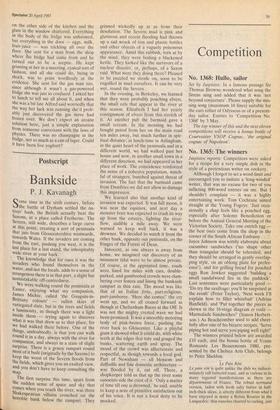Postscript
B ankside
P. J. Kavanagh
ome time in the sixth century, before the battle of Dyrham settled the na- tives' hash, the British actually beat the Saxons, at a place called Fretherne. The Severn, still wide, describes a large curve at this point, creating a sort of peninsula that juts from Gloucestershire westwards, towards Wales. If the invaders are coming from the east, pushing you west, it is the last place for a last stand, the inhospitably wide river at your back. The knowledge that for once it was the Invaders who found themselves in the water, and not the locals, adds to a sense of strangeness there is in that part, a slight but unmistakable off-centredness.
We were walking round the peninsula at Easter, enjoying what my companion, James Michie, called 'the Gauguin-in- Brittany colours' — sullen skies of variegated slate, but in the trees and fields a luminosity, as though there was a light Inside them — trying again to discover what it was that drew us to that place, for we had walked there before. One of the things, undoubtedly, is that you can walk round it in a day, always with the river for companion, and always in a state of slight surprise. There is a grassy rampart round most of it built (originally by the Saxons) to keep the worst of the Severn floods from the fields, which gives you an exalted view, and you don't have to keep consulting the map.
The first surprise this time, apart from the sudden sense of space and sky that comes when you reach the river, was three Shakespearian villains crouched on the horrible bank below the rampart. They grinned wickedly up at us from their desolation. The Severn mud is pink and glutinous and recent flooding had thrown up a sad wrack of tins and plastic bottles and other objects of a vaguely poisonous appearance. Amid this rubbish, torn at by the wind, they were boiling a blackened kettle. They looked like the survivors of a nuclear disaster, or, perhaps, of a Saxon raid. What were they doing there? Pleased to be puzzled we strode on, soon to be engulfed in mud ourselves. It can be very wet, round the Severn.
In the evening, in Berkeley, we learned that they were probably poaching elvers, the small eels that appear in the river at this season. Elizabeth I had her yearly consignment of elvers from this stretch of it. At another pub the barmaid gave a small scream. In the morning we had bought petrol from her on the main road ten miles away, but much further in spir- itual distance; at lunch-time in Arlingham, in the quiet heart of the peninsula and in a different world, we had walked past her house and now, in another small town in a different direction, we had appeared in her place of work. The coincidence reinforced the sense of a cohesive population, watch- ful of strangers, bunched against threat of invasion. The fact that the barmaid came from Dumfries we did not allow to damage this impression.
We learned also that anoth9r kind of invasion was expected. It was full moon, it was near the equinox; and next day a monster bore was expected to crash its way up from the estuary, fighting the river- flow, audible a mile away. We were warned to keep well back, it was a drowner. We decided to watch it from the other bank, opposite our peninsula, on the fringes of the Forest of Dean.
Innocent, as one always is away from home, we imagined our discovery of an imminent tidal wave to be almost private. Of course, at the appointed time, roads were lined for miles with cars, double- parked, and gumbooted crowds were clam- bering over fences and lining the bankside rampart in thin rain. The mood was like that of an Italian feria, part-religious, part-jamboree. 'Here she comes!' the cry went up, and we all craned forward as though at Cheltenham Races at the Off. It was not the mighty crested wave we had been promised. It was a smoothly motoring body of pink-brown force, pushing the river back to Gloucester. Like a playful giant it showed what it could do, with white teeth at the edges that tore and gouged the banks, scattering earth and spray. The mood of the crowd was affectionate and respectful, as though towards a local god.
Part of Newnham — all blossom and daffodils and fine domestic architecture - was flooded by it, cut off. There, a shopkeeper told us that up the river some canoeists ride the crest of it. 'Only a matter of time till one is drowned,' he said, unable to keep a note of primitive satisfaction out of his voice. It is not a local deity to be mocked.














































 Previous page
Previous page